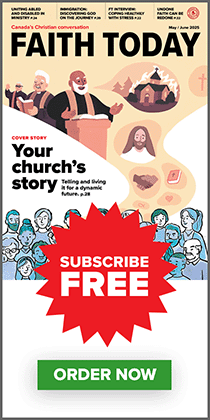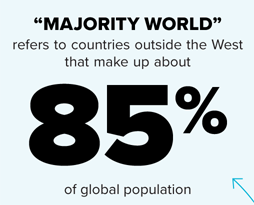Canadians look ahead to collaborating at Lausanne 4 in Korea

→en français
Illustrated for Faith Today by Janie Hao
In September Letty Wong will make the 15-plus hour flight from her home in Ottawa to Incheon, South Korea. She’s one of 140 Canadian delegates attending Lausanne 4, a global congress where thousands of Christian leaders from around the world unite over the Church’s shared mission and future.
Wong directs field ministries for Ambassadors for Christ in Canada (AFC), an organization that disciples students (primarily of Chinese descent) through spiritual formation, Scripture study and leadership development. She is eager to see how the Lausanne 4 conversations and collaborations will strengthen AFC’s work with students.

Letty Wong of Ambassadors for Christ in Canada is a delegate at Lausanne 4. Photo: AFC Communications Team (Wing Tang and Clarence Pong)
“Global gatherings really help shift perspective and focus on where we are engaging,” she says. “And as we’re journeying with students, it also opens up possibilities of what discipleship looks like and how they can also participate in missions.”
Lausanne is a global network where Christian leaders research, pray and work together on missional issues. It has grown and sprouted in many directions, including national committees like Lausanne Canada and 12 regional networks.
Wong, who is also a new mom, views participating in Lausanne’s global network as part of building her own understanding of the Church, which will influence not only her work, but also how she teaches her daughter.
“Often we only see a glimpse of the gospel in our context, our boundaries,” she says. “Having that opportunity to see the connectedness of the global Church will really influence the stories I tell her.”
Lausanne’s congress will take place from September 22–28 with about 5,000 in-person attendees and up to another 5,000 attending virtually.
The congress will focus on questions like: What are the prominent challenges the Church currently faces in fulfilling the commission Jesus gave – to go and make disciples of all nations? How can churches address these gaps to better live out our mission as witnesses to Christ in our world?
-- Advertisement by C12 Business Forums. Click to learn more. --

These questions matter, especially since Christianity has not grown in the last hundred years. In 1900 Christians represented about 33% of the global population. Since then that percentage, while keeping up with population increases, has remained essentially the same.
Ahead of Lausanne 4, a team of researchers compiled the State of the Great Commission to learn more about global trends and identify challenges impacting growth in the Church.
From the report 25 gaps were identified, including the global aging population, reaching the next generation, the new middle class (those who’ve recently benefited from economic growth, technology advances or social changes), secularism, least reached peoples, artificial intelligence, sexuality and gender, people on the move, ethnicism and racism, and digital com munities. (You can find a full list of the gaps and a little bit about them in the sidebar at FaithToday.ca/GCGaps.)
Alongside these gaps the report identified 40 trends and ten ongoing questions expected to shape our world over the next 25 years. It also covers specific regional considerations, offering more contextual detail for each of these trends.
“We’re all often very busy with our own organizations, doing great work heads down, doing what the Lord has called us to do,” says Matthew Niermann, who directed the report’s creation. “The State of the Great Commission provides that opportunity for people to look up from their particular tasks and see what’s happening around the world.”
Niermann, a professor at California Baptist University, describes the report as an invitation for the Church to engage with the key issues of our world today. Beginning in 2021 a research team conducted global literature surveys across every region and multiple languages. The team studied both secular and church sources to get a sense of key cultural, economic, political and theological issues.
The report is a powerful witness to the global Church community with over 150 authors – 35% from the Global West, 40% from the Global South and 25% from the Global East. It is available in English, French, Spanish, Portuguese, Russian, Mandarin and Korean (which are also the seven official languages of the congress itself).
The State of the Great Commission report highlighted trends and challenges to the Church’s growth: Here are just a few stats:







SOURCE OF DATA FOR GRAPHICS: STATE OF THE GREAT COMMISSION
The Church continues to move and change. Over the past century Christianity has grown the most in Sub-Saharan Africa and declined the most significantly in the Middle East, North Africa and Western Europe. In Europe and North America, Christian populations are aging while Sub-Saharan Africa’s youthful Christian demographic suggests the region will be increasingly central to Church growth.
We’re all often very busy with our own organizations, doing great work heads down, doing what the Lord has called us to do.
 Joel Zantingh of Guelph, Ont., director of engagement for Lausanne Canada, hopes participating in the congress will underscore for Canadian delegates the importance of listening to “the Majority World, where Christianity is growing and experiencing vitality.” This includes listening “more diversely within our own context, centring those who have existed on the margins because they are the voices of hope and leadership for the future of the Canadian Church.”
Joel Zantingh of Guelph, Ont., director of engagement for Lausanne Canada, hopes participating in the congress will underscore for Canadian delegates the importance of listening to “the Majority World, where Christianity is growing and experiencing vitality.” This includes listening “more diversely within our own context, centring those who have existed on the margins because they are the voices of hope and leadership for the future of the Canadian Church.”
Delegates from each country – which will include members of the World Evangelical Alliance and the EFC – are selected based on representation targets such as 40% of delegates from each country being under 40 and 40% being women. Attendees are nominated and then carefully selected based on these metrics to ensure accurate demo graphic representation.
Each participant contributes a financial amount based on their personal circumstances, which can mean offsetting the costs for others, creating greater equity for participants coming from all over the world.
“It’s definitely an honour. It’s also very humbling because as much as I really want to go, going also means I’m committing to actually doing something about it,” Wong says. “It has helped my confidence to be a voice in this generation, but also as an Asian Canadian I get to see these networks and share stories of how God is moving here in ethnic diaspora communities.
It has helped my confidence to be a voice in this generation, but also as an Asian Canadian I get to see these networks and share stories of how God is moving here.
One of the gaps noted in the State of the Great Commission is the Church’s limited influence. In a Lausanne survey of 1,500 Christian leaders around the world, over 50% reported that churches in their region had little to no influence in their communities, and most said the Church’s influence was steady or declining.
This gap is pertinent to AFC’s work with young Christians about to enter the workforce. Wong sees a strong emphasis in her organization on equipping students to en gage in faith-based settings, but believes they could better support students with integrating into secular professions and participating in society.
“It’s really relevant to the students we work with because 90% of them are not going into a Christian profession,” she says. She hopes to gain ideas and insight from Lausanne 4 that will shape how her team trains staff to better respond to this gap.
Beyond gaining a global perspective, Lausanne gatherings can often be a catalyst for action. During its first gathering in Lausanne, Switzerland, in 1974 the organization introduced the Lausanne Covenant.
The covenant marked a significant shift in the evangelical community with a public affirmation that the whole gospel includes both social action and teaching about Jesus. It challenged Christians to work together to make Christ known throughout the world. This landmark document still unites Evangelicals around the world and informs the statements of faith many Canadian churches use today.
What is the Lausanne Covenant?
“World evangelization requires the whole Church to take the whole gospel to the whole world.” This often-quoted line in the Lausanne Covenant reflects the heart of a pivotal document in Protestant history. It’s a rallying cry for the global Church to work together and keep focused on the full vision Scripture outlines for sharing the Good News in both word and deed.
In July 1974 over 2,000 Christians from over 150 nations gathered in Lausanne, Switzerland. At that gathering the Lausanne Covenant was born. The 15-point document is an ecumenical declaration of faith and commitment to global evangelization.
The Covenant addresses the Church’s social responsibility, the need for culturally relevant evangelism and the empowerment of indigenous church leadership in each country. It affirms belief in the triune God, emphasizes the divine authority of the Bible and the necessity of evangelism. It highlights the urgency of reaching the unreached, and the importance of unity and cooperation in evangelistic efforts. The covenant also underlines our reliance on the Holy Spirit to guide and empower the Church’s mission, and looks forward to the fulfillment of God’s perfect Kingdom.
This important and historic call to action urges Christians to commit to living out their faith in every aspect of their lives. Originally written in English the Lausanne Covenant has now been translated into at least 20 languages. It is considered one of the most significant documents in modern Church history.
Practical responses to poverty and injustice emerged at subsequent Lausanne gatherings. “Lausanne functions as a place of gathering where God develops conviction for new innovation,” Zantingh says.
Endiro Coffee is one example of a partnership sparked at Cape Town in 2010. At that congress Ugandan Gloria Katusiime and American Cody Lorance met, and together they founded a coffee chain committed to equitable partnerships with farmers in Uganda. Through relationship building and business profits, they support other contextual development work within these communities with a special focus on supporting vulnerable children.
The Lausanne 4 congress will mobilize church leaders to respond to the key gaps identified in the State of the Great Commission. During the first four days of the congress, attendees will have two-hour sessions each afternoon to work together using a new process called Collaborate.
Collaborate is the result of early feedback from potential participants who said they wanted to network and get things done, not come and hear talks and then return home. The process was designed by David Benson, who works for The London Institute for Contemporary Christianity, and Ann Chow, who runs her own project management company in Toronto.
“We’re actually asking people to come with the expectation that this is a working congress,” says Chow. “They will come and roll up their sleeves and sit down with the same group of six people around a table.”
Attendees filled out a survey to determine which of the 25 gaps most interest them and what areas of engagement they resonate with. They will be divided into 25 groups and seven smaller affinity subgroups to help them have more tailored conversations based on interests such as mission strategy, reaching people, or justice and advocacy.
“Everybody is supportive of collaboration. I mean, who wouldn’t be?” says Chow. “But then when you ask them, ‘Have you done it? Are you doing it?’ They’re like, ‘Oh no, we’re not doing it. That’s for those experts over there.’ So what we’re trying to do is let people know that they are actually a really critical part of global collaboration within the global Church.”
What we’re trying to do is let people know that they are actually a really critical part of global collaboration within the global Church.
The training and practice in collaborating should give participants a toolkit they can replicate in their home cities and countries. The process is also designed to help people form like-minded connections. It creates an organized structure that can facilitate the organic process of building trust and forming relationships.
To further these conversations Lausanne Global launched an app in July 2024. It will allow the thousands of online and in-person participants to continue their relationships after the congress.

Illustration: Janie Hao
After the Incheon gathering the North American delegates will regroup in Chicago in late October at the Amplify Conference put on by the Billy Graham Evangelistic Association. Lausanne Canada plans to coordinate regional gatherings into 2025 to gather and process some of the top insights Canadian delegates received. These learnings will create a collaborative action report for Canada.
For Canadian leaders like Wong, Lausanne opens up the global Church, allowing her to network and discover resources to share within her own church and ministry. Events such as Lausanne 4 pave the way for deepening and expanding these ties to Christians around the world.
Lausanne is “a place of convening for listening together in humility to the Spirit of God,” says Zantingh. “As the Canadian Church we need that sense of humility. We can often approach our participation in God’s mission with a sense of our own strategies. Environments where we’re forced to sit as one of many perspectives on the mission of God can awaken us to get out of the driver’s seat and allow us to hear a rejuvenation of the Kingdom of God.”
Ilana Reimer is a writer living in Vancouver. Discover key takeaways from the congress by signing up for Lausanne Canada’s newsletter at LausanneCanada.com/newsletter.